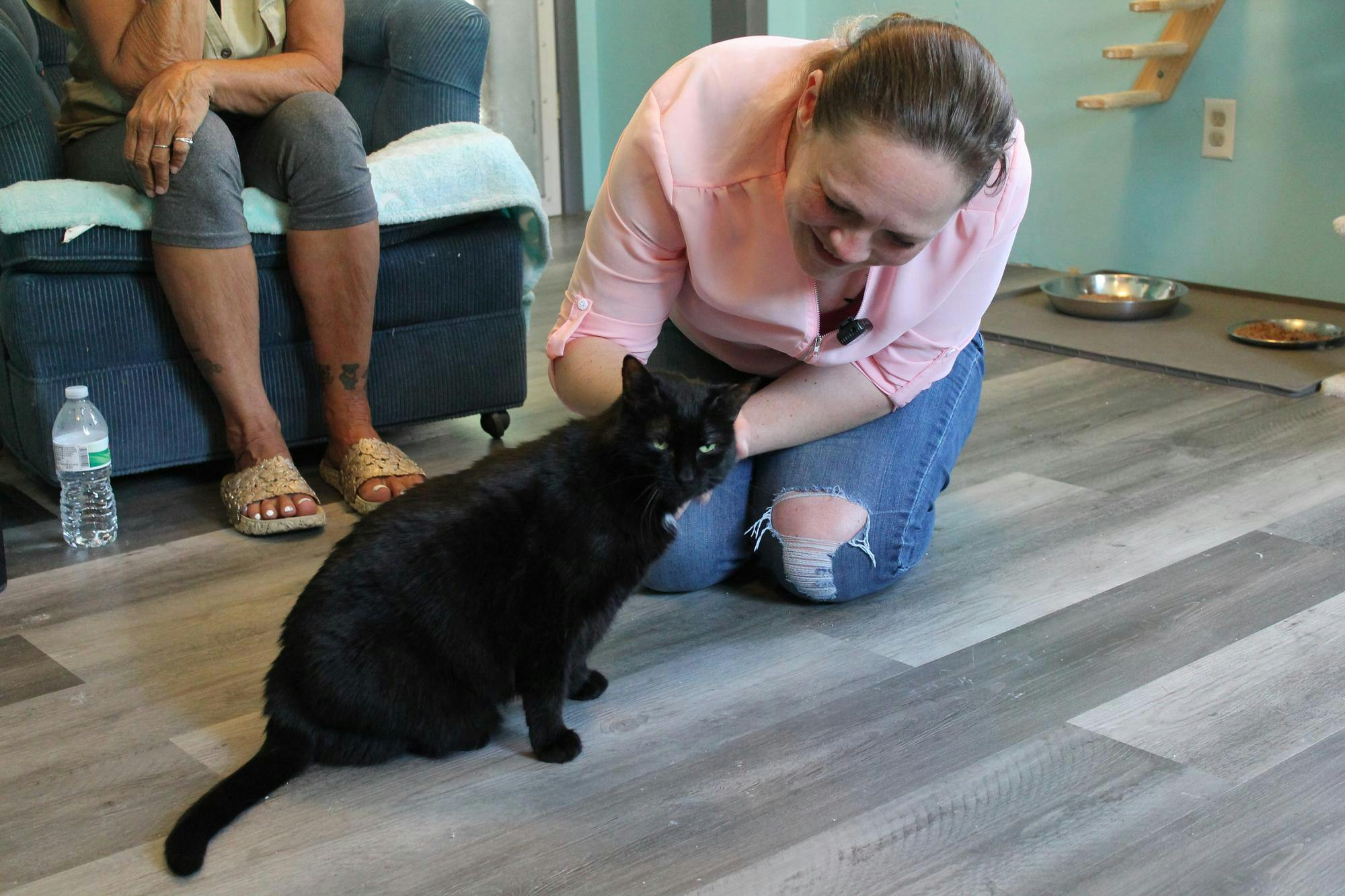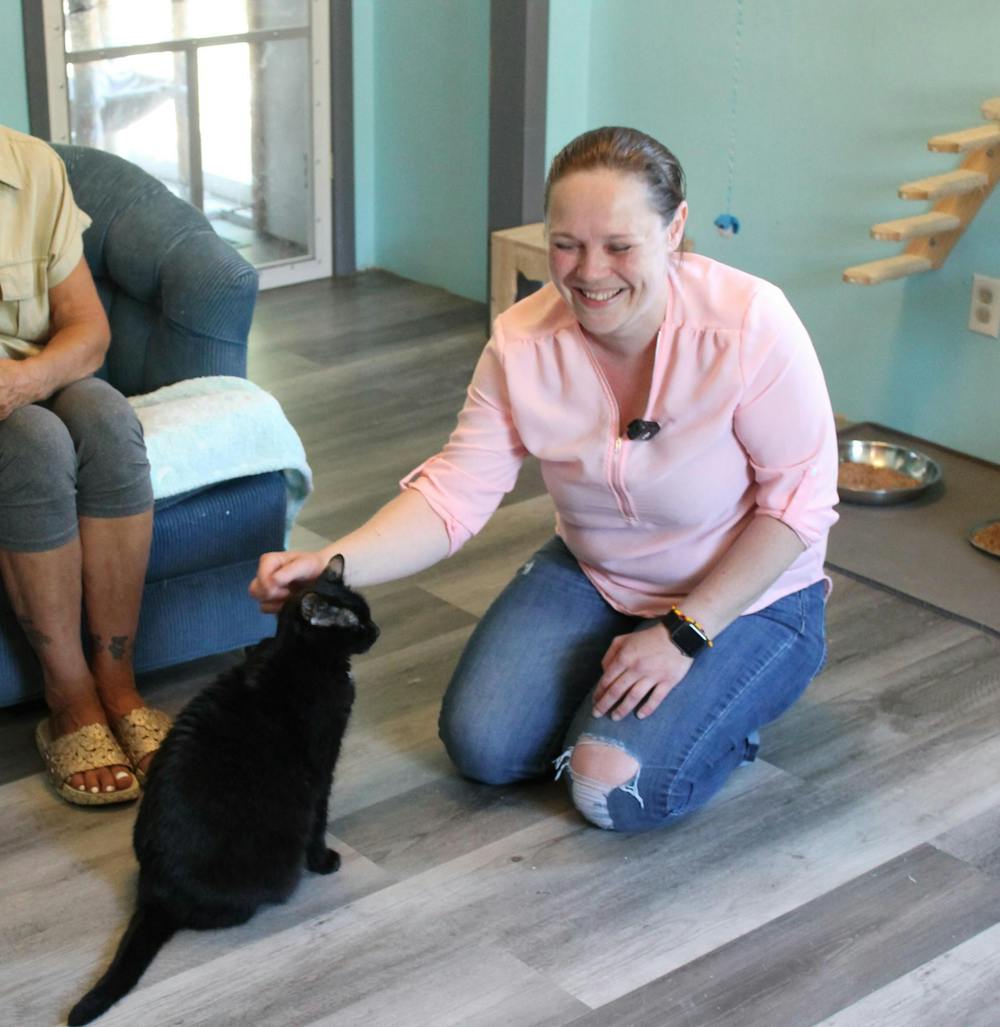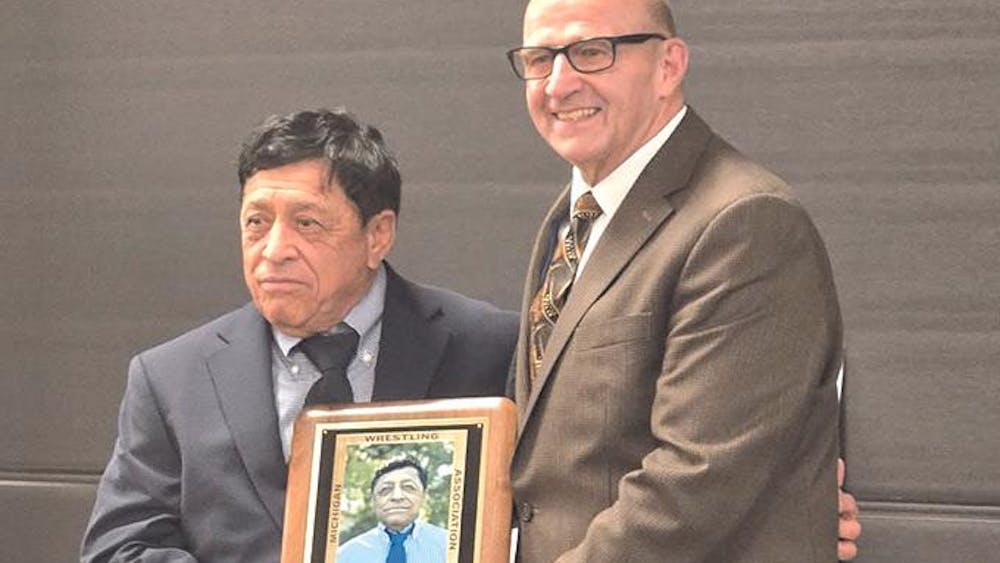When Oceana County Animal Friends (OCAF) received a female black cat, it was obvious that she had been well-loved and cared for, even before she came into the possession of the Montague couple who surrendered her. It was a hard decision to give up the cat, a stray who they’d routinely been feeding before letting inside the house in January, but she hadn’t been getting along with the other cats, even after six months.
In any routine surrender, OCAF takes adult cats down to CSNIP in Grand Rapids to receive a rabies vaccination and check for previous sterilizing procedures or any microchips. In this case, she had been spayed before coming into the care of the Montague couple, and not only did she have a microchip, but the microchip was registered to an international number.

Amy VanderWilk, director for OCAF, inquired further with the microchip company, HomeAgain, and found that there was a note on the microchip stating that Trixie, as was her actual name, had been missing since 2020 and, if found, there was an email through which to inform the owner. Amy took no time in reaching out to the owner, Olga Heibig, in Germany, asking what she’d like OCAF to do. In the past, OCAF had tracked down the owners of five separate cats, some of whom had asked the shelter to rehome the pets.
Olga was adamant. Amy recalled, “No. This is my cat for life; I will come get her.”
Thus started an international saga of reunification filled with plane rides, health certificates and a tearful reunion at the shelter in Mears.
The story from Olga’s perspective is just as riveting, filled with serendipitous moments bordering on fate. Originally from Germany, Olga came here for her late husband’s work at a German company that had North American headquarters in Bluffton, Ohio. There she and he lived several years, making close friendships with her neighbors and taking in several cats.
“I always wanted to do something like this [owning a shelter], because I always felt pity.” It’s how she ended up with Trixie in the first place, taking in two pregnant neighbor cats in Bluffton and caring for them and their kittens. Trixie was born at Olga’s house in Bluffton. She tried to find suitable homes for all of the cats, but by the time Olga and her husband moved up to Montague in October of 2020, they had ten in total.
Olga imagines it was the stress of moving all the cats from Ohio to Michigan that caused Trixie, her brother Flausche, and two other cats to run away from their new home in Montague. It was right before winter, and Olga feared they might not make it through the harsh season. In December 2020, her husband’s company decided not to extend his contract and, per American work visas, they had six weeks to pack up and leave.

Despite the chaos and frustration of needing to pack up and move all over again, this time internationally, Olga still searched for her missing cats up until the day they left. “I looked, I don’t know for how many weeks. Every night I went out at 1 o’clock, 2 o’clock in the night and was calling for them. And, unfortunately, none of the cats showed up.”
Olga had practically lost all hope until two years ago, when she received notice that Trixie’s brother Flausche had been found. A woman in Montague had been caring for him before finally deciding to take him to a shelter. “[But] she brought him to a kill shelter. Thank God he had a microchip,” Olga recalls.
Paula Pride, Olga’s closest friend from Bluffton, was the one to retrieve Flausche and care for him until Olga could pick him up and take him home. Olga was elated that Flausche was found "because I never, ever felt they made it through that hard winter… I don’t know, after Flausche got found I was like, okay, maybe the other cats are still alive, too.”
Now, two years later, Trixie was found.
Paula agrees with Olga’s surprise, “the first time it was amazing… this time [Trixie] just blew my mind… anything is possible.”
Even before receiving news about Trixie, Olga felt hope she’d be found. “The funny thing is, before I got the phone call or the email… I was just thinking about her.” She says how every year after moving, she’d come back to visit friends in America and even drove up to Montague and the Silver Lake Sand Dunes with her boyfriend to show him the area. “People say she must have smelled me,” Olga joked. But, for health reasons, Olga struggled to organize a trip to America this year, “and then, no, Trixie wanted me, and that I come again.”
“The first time I got the email [that Trixie was found], I just called because I thought, [Amy] doesn’t know me, I’m sitting in Germany. So probably she thinks I’m just saying stuff and that I probably never show up.” Olga worried that OCAF might not care for Trixie long enough for her to arrange travel to America, but Amy dissuaded her fears. They kept in constant contact, with OCAF sending pictures and videos, and worked together to arrange the health certificate needed so Trixie could go to Germany.
Amy spoke briefly of the stress surrounding the health certificate, how it was good that they got the rabies vaccine as soon as possible at CSNIP, otherwise Trixie wouldn’t be able to travel internationally for 21 days. They also had to make sure her real age and name were correct on the certificate after learning the information from Olga. After all that, the health certificate arrived the morning of the Monday Olga arrived in Mears, just in the nick of time for the two to travel home from Detroit the following day.
The day Olga and she reunited, Trixie could tell all the attention was for her. She sat regally in the middle of her room in the OCAF shelter, watching as volunteers and journalists filed in to watch. She was friendly with everyone, padding over to every newcomer for pets, but it was different for Olga. When Olga opened the door, cooing in a language Trixie likely hadn’t heard in almost five years, she trotted over to greet her old owner.
“Hallo, Trixie-Trix. Meine Trixie, meine Schatzi,” Olga murmured softly. Roughly translated: “Hello, Trixie-Trix. My Trixie, my darling.”

Olga couldn’t help scooping Trixie into an embrace, which Trixie did not care for - “She never liked that,” Olga assured - but she stayed at her owner’s side throughout the interview, rubbing against her legs and laying contentedly nearby. She seemed at peace in Olga’s presence. They may have only been together for two years before Trixie was lost, but Olga had been there the moment Trixie was born.
According to an update from OCAF, Olga and Trixie had a smooth trip back to Germany, where Trixie will now reunite with her brother and the other cats she grew up with. Olga believes Trixie will enjoy her town, a small little touristy village an hour outside of Munich, where the speed limit is low and she can sun outside in the yard.
When asked if she has hopes that her remaining two cats will be found and she can reunite with them, Olga said that now she “has even bigger hope… It really feels like a sign.” The two other cats, also all-black and microchipped, were called Chip and Chap, and very well might still be living around Montague. While Olga and OCAF are thrilled to have found Trixie, they can’t help but wonder if this reunification might have happened sooner had anyone thought to check for a microchip.
According to the American Humane Society, more than 10 million pets are lost or stolen every year in the US, but microchips can more than double the odds of future reunification if the pet finds its way to a shelter. Microchips are not GPS trackers and the only way to access the owner’s contact information is for a shelter or veterinary clinic to contact the microchip service provider directly. As of recent years, between 5% and 8% of pets are microchipped in the US, and even fewer of that number are registered after implantation. The typical cost for a microchip implantation is between $30 and $50, with some providers offering free registration.
For Olga’s part, she paid extra for a microchip that would work internationally. “If you really love your animal, I would definitely microchip them,” she advised. “If she (weren’t) microchipped, she would probably have ended up at another family, and then maybe again at another family…”
Olga is excited to get to know the cat that Trixie has grown into these last five years. “If she could talk I would be so curious to hear her story… She was actually a shy cat. She never walked up to people.”
When asked if Trixie is going to stay with Olga for the rest of her life, there was no doubt in her mind. “Of course, yes, and if I have to move, then she is going to come back with me.”
“They are my kids… For me, if I take in a cat or a pet, then it’s my family, and that’s it.”














